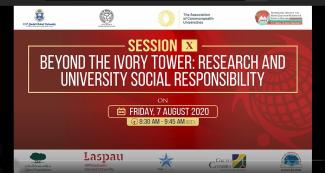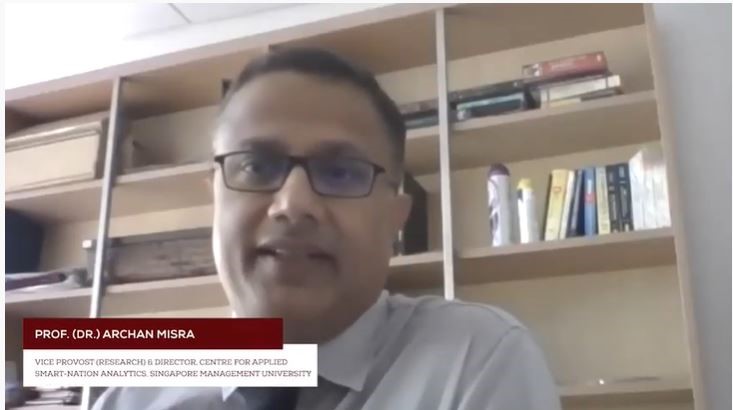
“A university exists to serve its community, and fundamentally most of the world’s great universities have created wonderful, positive impact on their own neighborhood… this is how they derive value” says SMU Vice Provost (Research) Archan Misra.
Professor Misra shared this thought during the thematic session “Beyond the Ivory Tower: Research and University Social Responsibility” at the O.P. Jindal Global University (JGU) Global Virtual Conference on 6th August 2020, alongside leading educators from JGU, The University of Melbourne and the University of California, Davis.
Themed ‘Reimagining and Transforming The University: Confluence of Ideas during and beyond the COVID-19 Disruption’, the virtual conference, which brought together a range of distinguished speakers including Vice-Chancellors, Presidents, and experts from the field of higher education from India and across the globe, explored themes on the shifting paradigm of global education resulting from the Covid-19 pandemic. The conference presented an excellent platform for SMU to dialogue with global leaders and connect with counterparts and prospective partners in India, including from the Association of Indian Universities.
Discussion during the hour-long session explored the important role that research plays within a university, and views on the notion of universities producing world-class research as a form of social responsibility. Professor Misra said that unequivocally, research is important to a university. The question therein was about measuring the social impact of research. He surmised that though challenging, research impact had to be measured across two timescales. On one end, fundamental research takes a long time to gestate, while applied translational research demonstrates impact within a shorter timeframe; universities have to balance between these two extremes. Emeritus Professor Fazal Rizvi of the University of Melbourne concurred with Professor Misra’s view of measuring research productivity and impact, and opined that there was currently “not as much discussion around the notion of what counts as [research] productivity…” He commented that he was “most disappointed that most of the impact have been [measured] in the traditional quantitative terms are frankly meaningless.”

Professor Misra added that at SMU, researchers are informed early in their career of the importance of research work with societal impact, in addition to academic lustre. This is critical in encouraging researchers to produce research of high social value and impact. With research work increasingly dependent on the availability of data, universities are well poised to facilitate interactions between researchers, public agencies and private organisations, and enable access to data. This creates a positive cycle where researchers are motivated to participate in conversations to ensure real world applicability for their research. These conversations are important in avoiding what Professor Misra termed as “muddled middle”, where researchers ended up doing research that was neither breakthroughs nor impactful to society.
With the world racing against time to develop a Covid-19 vaccine, research funding in universities are increasingly being diverted to the areas of medical science and healthcare, thus decreasing funding in other areas. Professor Misra shared with the panel that unlike in some countries where lines were drawn between academia and the private sector research funding considerations, the Singapore government takes a pragmatic view on this matter and encourages the confluence of academia, public agencies and private organisations to work together to provide funding to support impactful research. He shared with participants that SMU had worked closely with government agencies on smart city and nation initiatives, and the government’s innovative funding model had been effective in getting universities to engage sectors beyond the academic community.
A health crisis of this magnitude has affected all walks of lives and there is an urgency for universities to address the diverse range of social issues arising from this pandemic, such as fundamental questions on our education structure, online pedagogy and access, and addressing the needs of vulnerable groups. Professor Misra said that SMU schools have been actively responding to these new challenges. He described SMU’s research responses as rapid pivoting, taking on an experimental fail-fast approach to test out concepts in the shortest span of time possible. In addition, SMU researchers are engaging with social agencies to understand the challenges faced by society and using this understanding to frame their research. An example was SMU’s research into leveraging Wi-Fi networks for effective crowd detection and control to manage people concentration in high-density areas.
Looking ahead, Professor Misra shared that universities’ social responsibility is evolving, and posited that the next significant area of university research investment could be in the area of continuing education. In Singapore, continuing education has so far taken on a revenue-generating model with less attention paid to the science of teaching and learning of adult learners. The pandemic has accelerated the need for universities to provide re-skilling for those aged 45 to 50. Given this, research into adult teaching and learning, including the cognitive psychology and sociological aspects could be the next area where universities can create social impact.